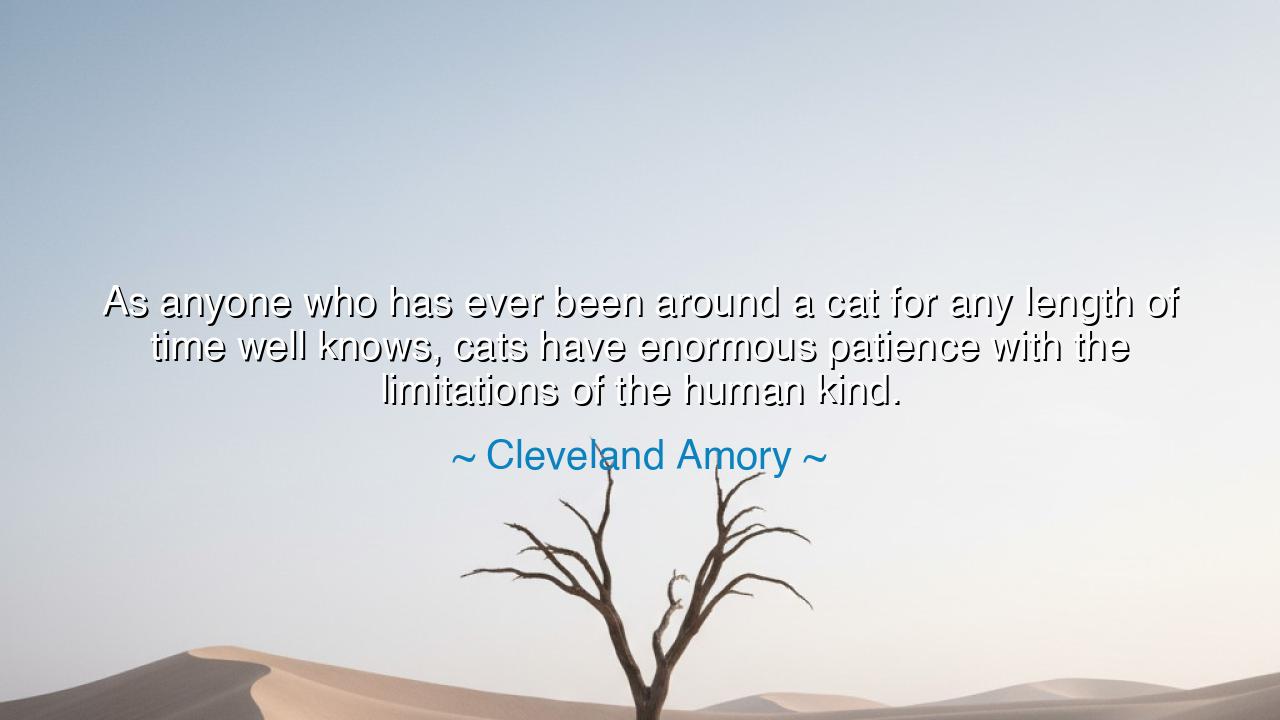
As anyone who has ever been around a cat for any length of time
As anyone who has ever been around a cat for any length of time well knows, cats have enormous patience with the limitations of the human kind.






Cleveland Amory, the defender of animals and chronicler of their quiet majesty, once observed with wit and tenderness: “As anyone who has ever been around a cat for any length of time well knows, cats have enormous patience with the limitations of the human kind.” These words, while playful, are also profoundly wise. They remind us that in the silent companionship of the cat, there is a mirror held to humanity—a mirror that reflects our own clumsiness, neediness, and folly, met not with contempt but with the silent patience of a creature more ancient in its dignity than we often realize.
The origin of this truth comes from Amory’s lifelong advocacy for animals, particularly through his work as a writer and founder of organizations dedicated to their welfare. He saw in the cat not only a beloved companion but a philosopher cloaked in fur. Cats live with us, yet apart from us; they accept our shortcomings, our awkward attempts at affection, our noisy disruptions, and still, they return to us with quiet tolerance. To live with a cat is to learn humility, for they reveal how limited we truly are in understanding the rhythms of nature and the language of silence.
History, too, has paid homage to this wisdom. In ancient Egypt, cats were revered as sacred beings, protectors of households and companions of the divine. They were seen not merely as hunters of vermin but as symbols of patience, mystery, and guardianship. The Egyptians, who placed statues of Bastet in their homes, understood that cats possessed a kind of serenity and judgment that surpassed human understanding. Even in their reverence, they acknowledged what Amory affirms: the cat’s patience with humanity is part of its greatness.
Amory’s words also uncover a hidden lesson about the limitations of mankind. Humans are quick to judge, quick to impose, and often restless in their demands. Cats, by contrast, will wait, will endure, will quietly adjust their expectations of us. A human may call, and a cat may choose to ignore; yet later, in a moment of calm, the cat may curl upon the same lap in quiet forgiveness. It is as though they know we are flawed, yet still worthy of companionship. Their patience is not passive, but a gentle superiority born of self-possession and wisdom.
This truth extends beyond cats into the broader world of relationships. How often do we, in our pride, fail to show such patience with one another? How often do we bristle at the faults and limitations of those we love? If even a cat—a creature not bound by duty or obligation to us—can show tolerance and loyalty despite our flaws, then surely we who boast of reason and morality can learn to meet one another with greater kindness and forbearance.
The deeper meaning here is both humbling and uplifting: animals, whom many see as lesser, often embody virtues we ourselves struggle to attain. The cat’s calm observation, its refusal to be hurried, its steady endurance of our blunders, are lessons in restraint and grace. They remind us that patience is not weakness but power—the strength to endure without anger, to wait without complaint, and to forgive without words.
Practical wisdom flows from Amory’s reflection. When you feel impatience rising toward those around you, remember the quiet eyes of the cat, who watches and waits. Practice seeing flaws without judgment, limitations without scorn. Cultivate silence in your relationships, and allow space for others to grow at their own pace. Just as the cat accepts us as we are, flawed and fumbling, so too can we learn to accept others with gentleness.
Thus, let Cleveland Amory’s words echo as a gentle teaching: in the patience of the cat lies a rebuke to human arrogance, and a model for human compassion. If you would live wisely, learn from these quiet teachers who walk among us on silent paws. For in their forbearance, they remind us that love does not demand perfection—it endures imperfection with grace.






AAdministratorAdministrator
Welcome, honored guests. Please leave a comment, we will respond soon